From August 15 to 17, the 2025 Global Business Innovation Conference (GBIC·2025), hosted by Yonyou, was grandly held in Shenzhen. With the theme of “Enabling AI to Take Root in Enterprises”, the conference gathered nearly ten thousand business leaders, senior executives, scholars, industry experts, and media representatives from China and abroad. Together, they explored the challenges and pathways of AI adoption in enterprises, innovative products and solutions, as well as successful practices from leading companies. This was the industry’s first large-scale, high-level summit with a focused theme on enterprise AI application.
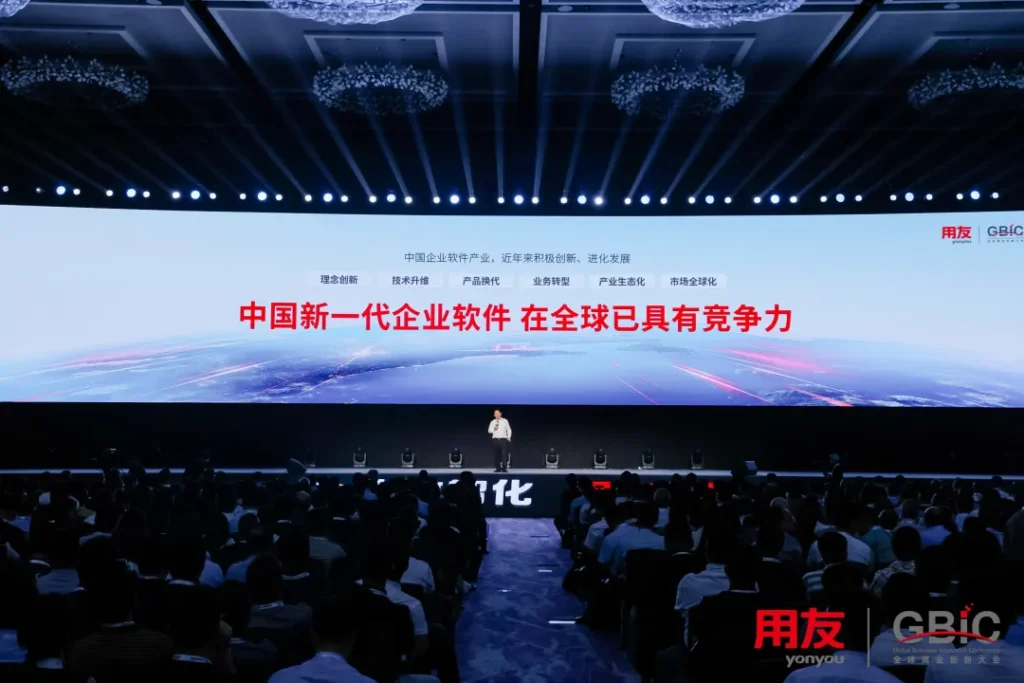
At the conference, Yonyou announced a milestone upgrade of its enterprise software and intelligent services platform — the launch of “Yonyou BIP 5.” Its core advantage lies in the native integration of AI × Data × Process, transforming enterprise software from a traditional “tool system” into an intelligent “business partner.” Through BIP’s enterprise AI, enterprise data cloud, process services, and digital intelligence foundation, it empowers enterprises to reshape business and management processes, activate data value, and enable end-to-end AI application.
Representatives from China Merchants Group, Anshan Iron and Steel Group, China XD, China Supply and Marketing Agricultural Products Group, Towngas, Wanhua Chemical, Likang Foods, Baigong Steel, Mixue Bingcheng, Lenovo Group, Siwei Zongheng, among others, witnessed the debut of Yonyou BIP 5. They shared best practices, announced ecosystem collaborations, and partnered with Yonyou to co-create the next generation of intelligent productivity.
01
Next-Generation Enterprise Software + Data & Knowledge Governance + Large Models: Making AI Application in Enterprises a Reality
With the rapid development of AI technology — particularly the surge of interest sparked by DeepSeek during the Spring Festival this year — AI in Chinese enterprises has shifted from the education phase to the application phase. AI integration across industries is accelerating, becoming a key driver of new productivity in this era.
To this end, the Chinese government has launched the “AI+” initiative, recently approved by the State Council. The policy emphasizes leveraging China’s strong industrial system, vast market, and rich application scenarios to accelerate AI adoption, deepen integration across sectors, and promote a cycle of innovation driving application and application fueling innovation.
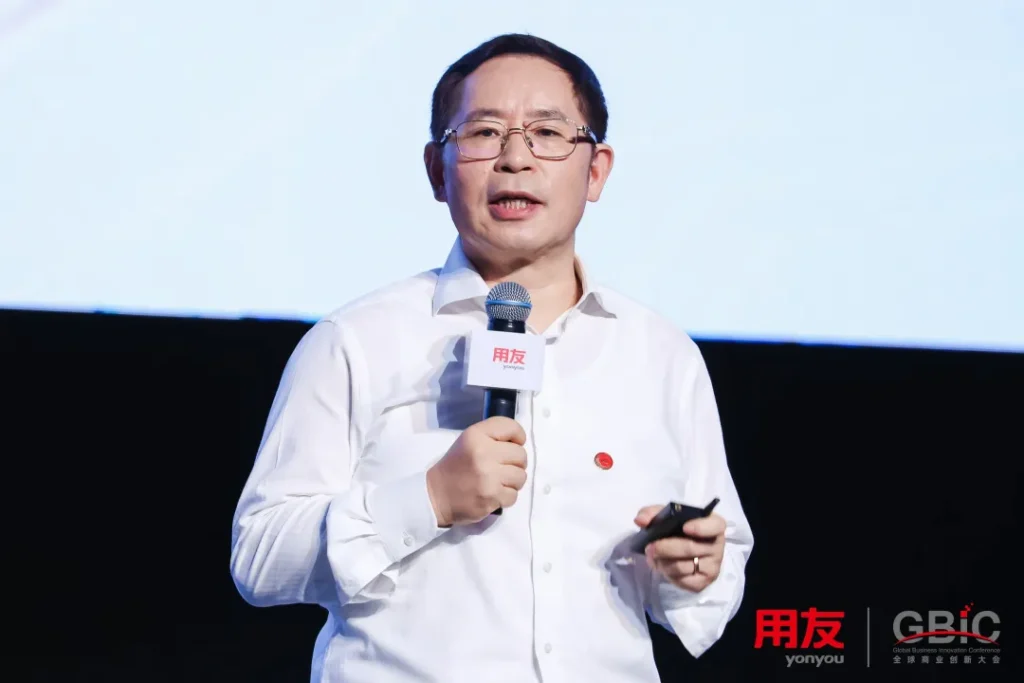
Enterprises, as the main arena for AI adoption, are facing unprecedented opportunities. Wang Wenjing, Chairman and CEO of Yonyou, noted four forces driving AI adoption in Chinese enterprises:
China’s leading digital intelligence business environment
Breakthroughs by Chinese tech firms in foundational AI technologies such as large models
Strong enthusiasm for AI adoption among Chinese enterprises
Active government promotion
Together, these factors position Chinese enterprises to lead globally in AI application.
Years ago, Yonyou pioneered the concept of “Digital Intelligence” (digitalization + intelligence) and developed the “Business Online – Data-Driven – Intelligent Operation” capability maturity model. Today, with the AI boom, more enterprises are moving toward the “intelligent operation” stage.
For enterprises, the goals of AI adoption are clear: efficiency improvement, cost reduction, precision management, and risk control. Achieving this requires three key actions:
Upgrading to next-generation enterprise software for digital intelligence
Strengthening data and knowledge governance
Integrating or deploying mainstream and vertical AI models
AI is also revolutionizing enterprise software:
Shifting from execution and collaboration to autonomous decision-making, planning, and action
Models (MaaS) becoming a core strategic component
Intelligent Agents emerging as new product forms
Interaction evolving from “menu-driven” to “natural collaboration”
Business models potentially shifting toward outcome-based pricing
AI empowering R&D, delivery, and services with high-productivity tools
According to Wang Wenjing, Chinese enterprise software has already demonstrated global competitiveness after years of innovation and transformation. AI adoption presents another opportunity for China to leap ahead — much like mobile internet platforms and new energy vehicles. Just as SAP and Oracle once globalized the best practices of German manufacturing and U.S. services, in the digital intelligence era, Chinese enterprise software and intelligent service providers will bring China’s innovations to the world.

At the conference, Piero Scaruffi, a well-known U.S. AI expert and Director of the Silicon Valley Artificial Intelligence Research Institute, stressed that enterprises worldwide must evolve from “+AI” (embedded AI) to “AI+” (AI-native). He emphasized that processes, data, and models are the three foundations for enterprise AI adoption, and that software — not hardware — is the true enabler.
02
Yonyou BIP 5: Achieving “AI × Data × Process” Native Integration
As Yonyou’s flagship next-generation enterprise software platform, Yonyou BIP has been continuously evolving since its debut. At the conference, Fan Guanjun, Executive Vice President and CTO of Yonyou, officially launched “Yonyou BIP 5.”
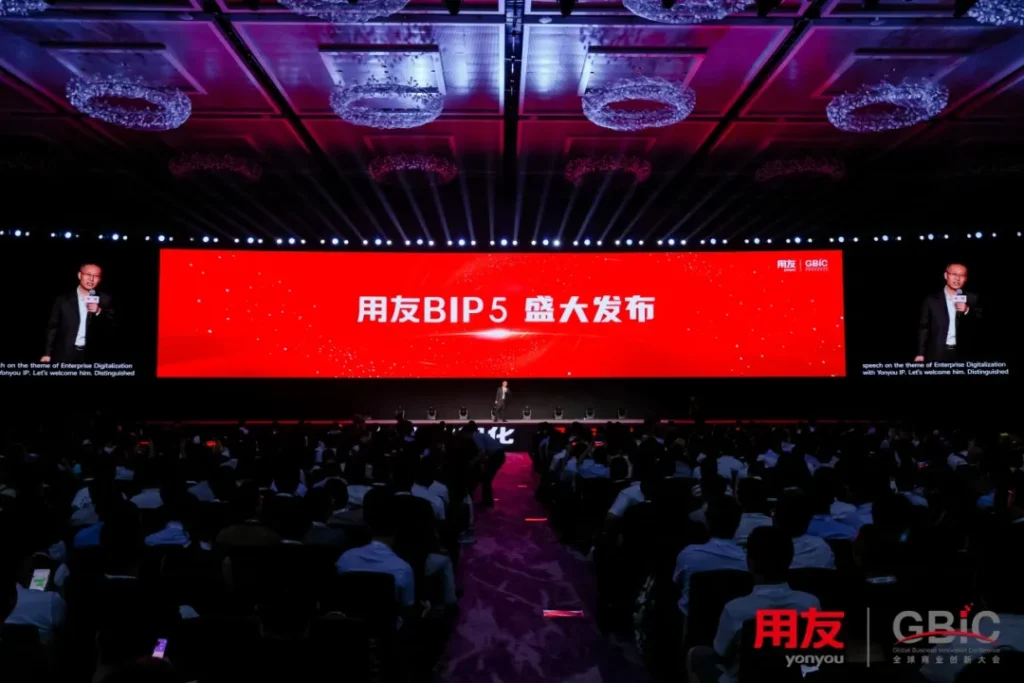
With its newly constructed digital intelligence architecture, Yonyou BIP 5 unifies the iuap foundation to seamlessly connect intelligent business processes, enterprise data cloud, and enterprise AI. This achieves native integration of AI × Data × Process with end-to-end closed-loop scenarios. AI capabilities are embedded across 14 categories of business processes and over 2,500 process scenarios, accelerating enterprise-wide AI adoption and digital intelligence transformation.
Key Features of Yonyou BIP 5:
Enterprise AI Product Matrix:
A one-stop solution with a unified foundation, embedded in core business, reliable, secure, and compliant. Provides a wide range of intelligent agents for complex enterprise scenarios.
“Zhiyou” Universal Agent:
Acts as a unified intelligent entry point for employees, capable of task planning, decomposition, and coordinating multi-agent collaboration through natural language.
New “Super Groups”:
More than just IM groups — they integrate human employees with digital employees, create shared knowledge bases, and feature assistants for project tracking, summaries, and reminders, redefining enterprise collaboration.
“YouZhiKu” Knowledge Companion:
A RAG-based solution integrating unstructured data into workflows, enabling intelligent document management, search, Q&A, and content generation.
Agent Building Platform:
Enables business users to build agents in under 10 minutes via no-code visual interfaces. Connects to over 4,000 APIs and integrates with finance, HR, supply chain, and more. Supports enterprise-level permissions, compliance, and multi-agent teamwork.
Enterprise Data Cloud:
Built on four layers — platform, data, model, and application — it transforms private enterprise data into enterprise intelligence, creating business value.
End-to-End Process Integration:
Covers finance, HR, supply chain, and 10 major domains with 14 first-level, 97 second-level, 547 third-level, and over 2,000 fourth-level process scenarios. Provides a complete map for digital operations, ensuring scenario-wide and process-wide AI enablement.
Through its iuap foundation — spanning application, data, AI, cloud, development, and integration platforms — BIP 5 eliminates silos of applications, data, and intelligence, ensuring consistent architecture, data standards, and security.
This native integration is Yonyou’s unique global advantage, enabling enterprises to overcome “application chimneys, data islands, and fragmented AI.”
03
Data-Driven, Intelligent Operations: Leading Enterprises Choose Yonyou BIP
Under the AI wave, enterprises worldwide are accelerating their digital intelligence journey. Yonyou BIP has become the platform of choice for over 65,000 large and medium-sized enterprises to achieve agile operations, lean management, and global business.
Examples:
Likang Foods uses BIP for intelligent sales forecasting and supply-demand matching.
Aier Eye Hospital adopted digital employees to handle tax codes, pharma compliance, and reconciliations, boosting efficiency nearly 8x.
Ansteel Group built 20+ domain-specific intelligent agents for marketing, price prediction, equipment failure analysis, and decision-making.
Baigong Steel is developing a steel industry large model, forming a continuously evolving industry brain.
China XD replaced international systems with BIP across subsidiaries in just six months, cutting monthly closing costs by 50%.
Wanhua Chemical built a global shared finance center with BIP, automating 100% of accounting and centralizing 100% of fund settlement across 66 companies in six months.
Mixue Bingcheng integrated BIP with multiple systems for cross-border finance and operations, fueling its global expansion.
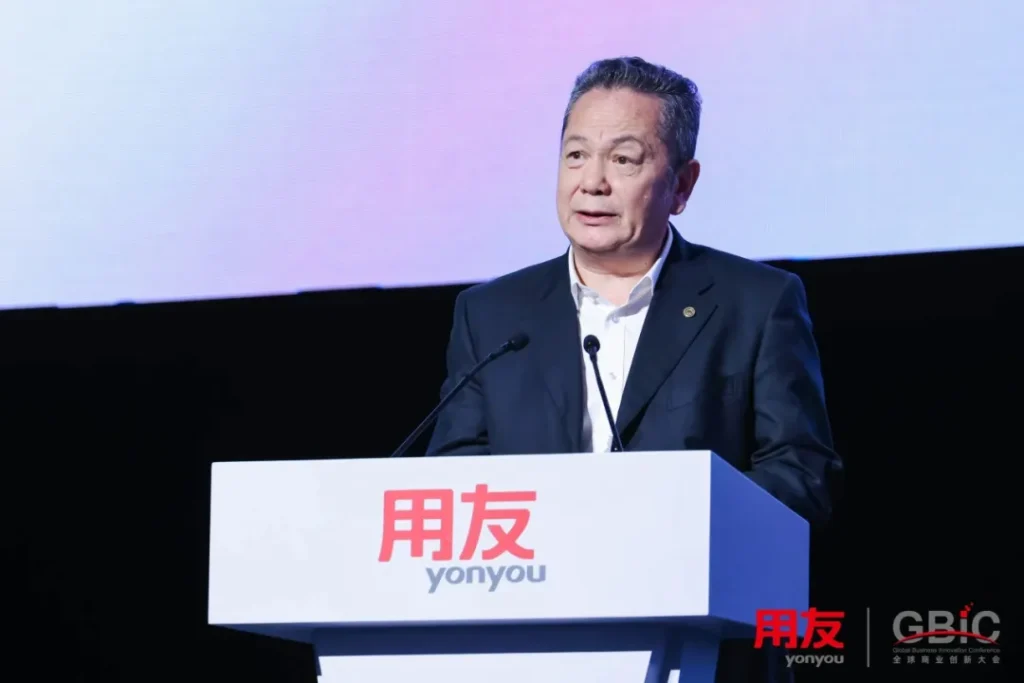
At the same time, an increasing number of large and ultra-large Chinese enterprises — including central SOEs and leading private companies — are gradually upgrading from international vendor systems to China’s new-generation enterprise software. Yonyou is the leading domestic provider of international system replacement projects. For example, China XD Group, based on Yonyou BIP, enabled its first batch of subsidiaries to fully complete system localization in just six months. The group built a digital-intelligence-driven management and control platform covering core modules such as supply chain, manufacturing, and finance. As a result, overall system performance and efficiency improved significantly, with some subsidiaries achieving over 50% faster monthly cost closing.
In recent years, Chinese enterprises have been accelerating their global expansion. Since embarking on its globalization journey in 2003, Yonyou has accumulated over 20 years of international delivery experience across more than 40 countries and regions. To date, it has sold and delivered solutions to over 1,400 overseas large and medium-sized enterprises, of which 60% are local clients and 40% are Chinese companies expanding abroad — making Yonyou the Chinese enterprise software vendor serving the most overseas customers.
For example:
Wanhua Chemical built a global financial shared service center based on Yonyou BIP. In just six months, it covered 66 companies, integrated 13 systems and 72 interfaces, achieving 100% automated accounting and 100% centralized fund settlement, providing strong digital-intelligence support for value creation in the finance department.
Mixue Bingcheng integrated Yonyou BIP with multiple self-developed business systems, achieving multi-system integration and cross-country business-finance unification. This injected strong momentum into its global expansion and set a benchmark for digital-intelligence-driven internationalization of Chinese brands.
In addition to these leading cases, many other enterprises are also making exemplary progress in digital intelligence and AI application, offering valuable, replicable experiences. As one of the most authoritative and influential awards in the field, the “2025 Digital Intelligence Pioneer Award” placed special emphasis on enterprise AI application scenarios this year, attracting active participation from numerous enterprises and industry leaders. Notably, central SOE cases accounted for over 60%. After in-depth research, rigorous evaluation, and a high-standard review process by the expert committee, 30 enterprises — including China Marine Bunker (CME), China Nuclear Engineering, China Merchants Group, Sinochem, China Xinhua Power, Ansteel, Kailuan Group, Xuyang Group, Muyuan Foods, and Eastroc Beverage — were selected as “Annual Digital Intelligence Pioneer Enterprises.” Meanwhile, 10 innovators were recognized as “Annual Digital Intelligence Pioneer Figures.” Together, they provide the industry with cutting-edge, high-value, and replicable best practices in digital intelligence.
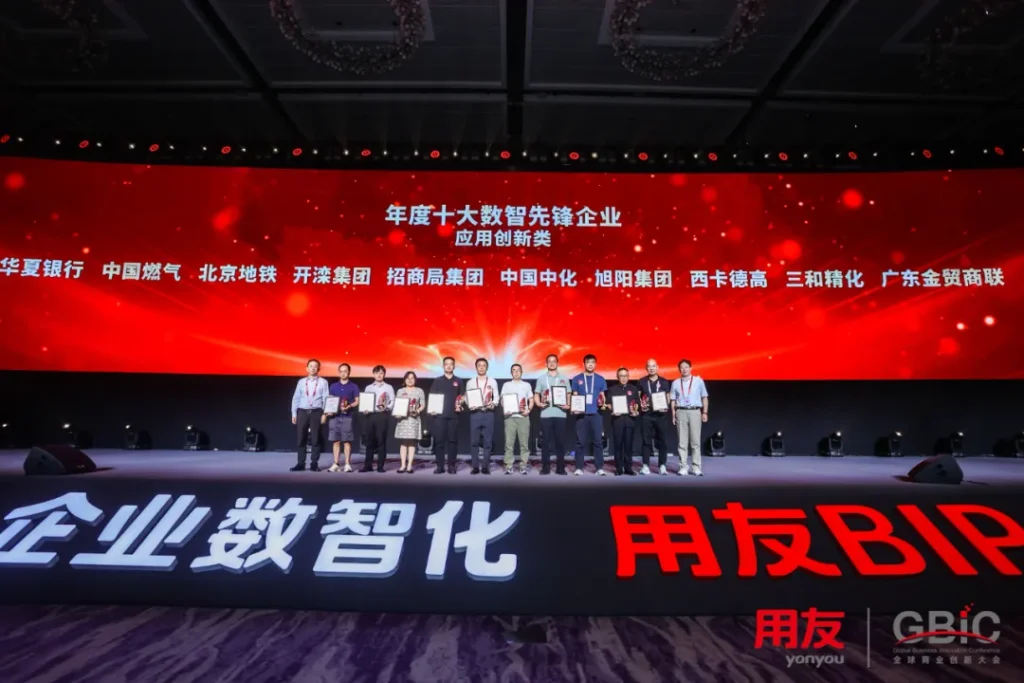
In the era of AI, enterprises’ demand for comprehensive digital intelligence services is becoming increasingly urgent, while the value of ecosystem collaboration is more prominent than ever. Enterprise software vendors must work hand-in-hand with ecosystem partners to provide clients with digital intelligence services that cover all scenarios, all cycles, and multiple forms.
“Ecosystem Co-Prosperity” has become one of Yonyou’s core strategies in this new era. Together with a wide range of partners, Yonyou is building a globally leading BIP ecosystem — not only in China but also in overseas markets. To date, the Yonyou BIP ecosystem includes:
Over 3,800 ISV partners
Over 1,000 professional service partners
More than 5,900 academic and training partners
Over 1.17 million registered developers
All of these work together to deliver professional, convenient, and scalable digital intelligence services for customers.
According to Gartner, Yonyou is the only Asia-Pacific vendor ranked in the Global Top 10 for high-productivity aPaaS, ERP SaaS, and Financial Management (FMS) markets, and the only Chinese vendor included in both the HCM Cloud Magic Quadrant and ERP Cloud Magic Quadrant. Meanwhile, IDC data shows that Yonyou continues to lead China’s enterprise cloud service market, ranking No.1 in China’s aPaaS market, No.1 in the enterprise SaaS market, and maintaining the top spot for large and super-large enterprise SaaS applications for consecutive years. Yonyou has become a national brand representing China’s autonomous innovation in enterprise digital intelligence software and software localization.
Looking to the future, Yonyou — as a pioneer of China’s next-generation enterprise software — aims to become one of the top three enterprise software and intelligent service providers worldwide. Its vision is to make Chinese enterprise software a new emblem of “Intelligent Made in China” both domestically and globally. Through joint innovation with customers, Yonyou will drive the large-scale adoption of AI in enterprises, making AI a new engine for business innovation, accelerating the spread of Yonyou BIP, and supporting digital intelligence transformation for enterprises in China and around the world — writing a new chapter in global enterprise digital intelligence led by China.

